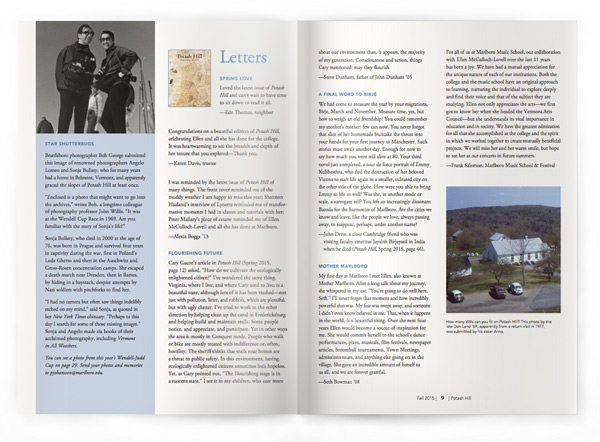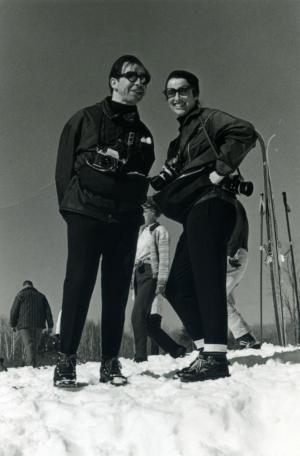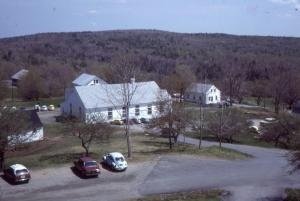Letters

Star Shutterbugs
 Brattleboro photographer Bob George submitted this image of renowned photographers Angelo Lomeo and Sonja Bullaty, who for many years had a home in Belmont, Vermont, and apparently graced the slopes of Potash Hill at least once.
Brattleboro photographer Bob George submitted this image of renowned photographers Angelo Lomeo and Sonja Bullaty, who for many years had a home in Belmont, Vermont, and apparently graced the slopes of Potash Hill at least once.
“Enclosed is a photo that might want to go into the archives,” writes Bob, a longtime colleague of photography professor John Willis. “It was at the Wendell Cup Race in 1969. Are you familiar with the story of Sonja’s life?”
Sonja Bullaty, who died in 2000 at the age of 76, was born in Prague and survived four years in captivity during the war, first in Poland’s Lodz Ghetto and then in the Auschwitz and Gross-Rosen concentration camps. She escaped a death march near Dresden, then in flames, by hiding in a haystack, despite attempts by Nazi soldiers with pitchforks to find her.
“I had no camera but often saw things indelibly etched on my mind,” said Sonja, as quoted in her New York Times obituary. “Perhaps to this day I search for some of those missing images.” Sonja and Angelo made six books of their acclaimed photography, including Vermont in All Weathers.
You can see a photo from this year’s Wendell-Judd Cup. Send your photos and memories to pjohansson@marlboro.edu.
Spring Love
Loved the latest issue of Potash Hill and can’t wait to have time to sit down to read it all.
—Ede Thomas, neighbor
Congratulations on a beautiful edition of Potash Hill, celebrating Ellen and all she has done for the college. It was heartwarming to see the breadth and depth of her tenure that you explored—Thank you.
—Karen Davis, trustee
I was reminded by the latest issue of Potash Hill of many things. The front cover reminded me of the muddy weather I am happy to miss this year; Shannon Haaland’s interview of Lynette reminded me of transformative moments I had in classes and tutorials with her; Peter Mallary’s piece of course reminded me of Ellen McCulloch-Lovell and all she has done at Marlboro.
—Alexia Boggs ’13
Flourishing Future
Cary Gaunt’s article in Potash Hill (Spring 2015, page 12) asked, “How do we cultivate the ecologically enlightened citizen?” I’ve wondered the same thing. Virginia, where I live, and where Cary used to live, is a beautiful state, although lots of it has been trashed—not just with pollution, litter, and rubbish, which are plentiful, but with ugly clutter. I’ve tried to work in the other direction by helping clean up the canal in Fredericksburg and helping build and maintain trails. Some people notice, and appreciate, and participate. Yet in other ways the area is mostly in Conquest mode. People who walk or bike are mostly treated with indifference or, often, hostility. The sheriff thinks that trails near homes are a threat to public safety. In this environment, having ecologically enlightened citizens sometimes feels hopeless. Yet, as Cary pointed out, “The Flourishing stage is in a nascent state.” I see it in my children, who care moreabout our environment than, it appears, the majority of my generation. Consciousness and action, things Cary mentioned: may they flourish.
—Steve Dunham, father of John Dunham ’05
A Final Word to Birjé
We had come to measure the year by your migrations, Birje, March and November. Measure time, yes, but how to weigh an old friendship? You could remember my mother’s mother: few can now. You never forgot that slice of her homemade fruitcake she thrust into your hands for your first journey to Manchester. Such stories must await another day. Enough for now to say how much you were still alive at 80. Your third novel just completed, a tour de force portrait of Emmy Kulshesthra, who fled the destruction of her beloved Vienna to start life again in a smaller, cultured city on the other side of the globe. How were you able to bring Emmy to life so well? Was she, in another mode or scale, a surrogate self? You left an increasingly dissonant Baroda for the harmonies of Marlboro. Are the cities we know and leave, like the people we love, always passing away, to reappear, perhaps, under another name?
— John Drew, a close Cambridge friend who was visiting faculty emeritus Jaysinh Birjepatil in India when he died (Potash Hill, Spring 2015, page 46).
Mother Marlboro
My first day at Marlboro I met Ellen, also known as Mother Marlboro. After a long talk about my journey, she whispered in my ear, “You’re going to do well here, Seth.” I’ll never forget that moment and how incredibly powerful that was. My fear was swept away, and someone I didn’t even know believed in me. That, when it happens in the world, is a beautiful thing. Over the next four years Ellen would become a source of inspiration for me. She would commit herself to the school’s dance performances, plays, musicals, film festivals, newspaper articles, broomball tournaments, Town Meetings, admissions tours, and anything else going on in the village. She gave an incredible amount of herself to us all, and we are forever grateful.
—Seth Bowman ’08

For all of us at Marlboro Music School, our collaboration with Ellen McCulloch-Lovell over the last 11 years has been a joy. We have had a mutual appreciation for the unique nature of each of our institutions. Both the college and the music school have an original approach to learning, nurturing the individual to explore deeply and find their voice and that of the subject they are studying. Ellen not only appreciates the arts—we first got to know her when she headed the Vermont Arts Council—but she understands its vital importance in education and in society. We have the greatest admiration for all that she accomplished at the college and the spirit in which we worked together to create mutually beneficial projects. We will miss her and her warm smile, but hope to see her at our concerts in future summers.
—Frank Salomon, Marlboro Music School & Festival
